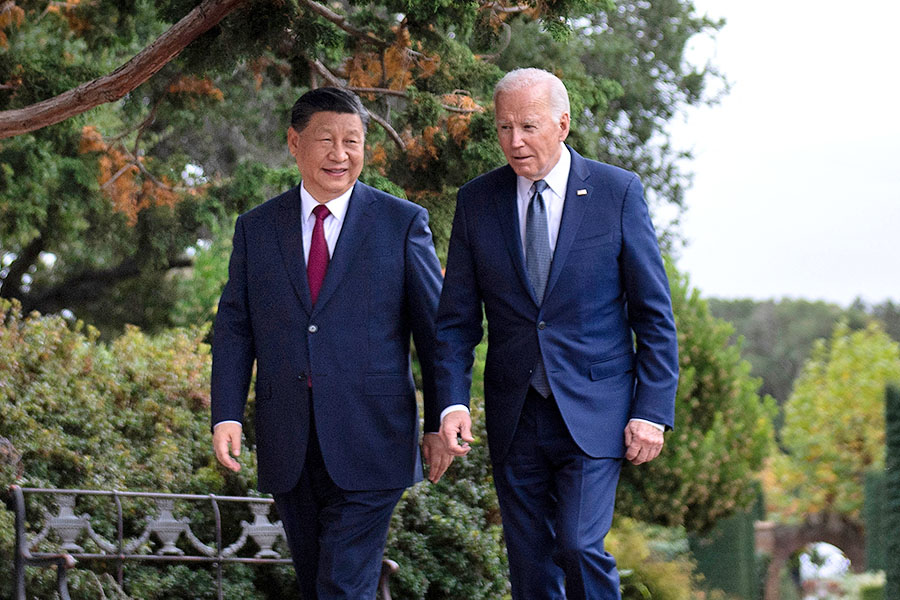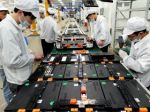
Thawing US-China relations: Competition meets interdependence
What are the biggest wins from the Biden-Xi meeting on the sidelines of the APEC Forum?
 US President Joe Biden (R) and Chinese President Xi Jinping walk together after a meeting during the Asia-Pacific Economic Cooperation (APEC) Leaders' week in Woodside, California on November 15, 2023. Image: Brendan Smialowski / AFP
US President Joe Biden (R) and Chinese President Xi Jinping walk together after a meeting during the Asia-Pacific Economic Cooperation (APEC) Leaders' week in Woodside, California on November 15, 2023. Image: Brendan Smialowski / AFP
The meeting of US President Joe Biden and Chinese President Xi Jinping in mid-November signalled the start of a diplomatic thaw – a much-welcomed reset after tensions escalated since the visit of Nancy Pelosi to Taiwan in 2022.
The most significant outcome from the hours of high-level dialogue is that channels of communication have reopened, and both sides are no longer using intemperate language. So what changed to spark the diplomatic thaw?
There is enough room
President Xi said that the planet is big enough for the US and China to co-exist. Beijing has since tamped down on the wolf warrior diplomacy it has been practising. At the same time, the US is shifting away from a zero-sum lens to a more realistic outlook – that of competitive interdependence.This comes with the acceptance that the US and China will continue to disagree on fundamental issues such as human rights and democracy and will continue to compete in sectors such as electric vehicles and other next-generation technologies. Yet, there is also an understanding that there is room for cooperation on issues such as climate change and global pandemics.
Some analysts have raised the spectre of a new Cold War. However, it is important to note that even during the Cold War, the Americans and the Soviets kept lines of communication open.
Hence, one of the two concrete pledges that came out of the meeting between Biden and Xi is the reopening of communication channels between the military, which had been suspended since Pelosi’s Taiwan visit. Second, the parties agreed to crack down on the flow of synthetic opioid drugs from China to Mexican drug cartels, which has been having a devastating effect on the US, known as “deaths of despair”.
Also read: How will the world economy look in 2024
Winds of geopolitical change
Two major global events have accelerated the thawing of relations. First, the attack by Hamas and the Israeli retaliation could easily tip the Middle East into a state of instability. The US, which had pivoted to Asia, finds itself scrambling to stop a major regional conflict and convince its Arab allies not to put in place an oil embargo as they did after the Yom Kippur War – all while continuing to help Ukraine to fight Russia’s invasion.At the same time, China is increasingly respected in the Middle East. With these looming threats, it is not surprising that the US is pursuing talks with China. US – and the world at large – cannot afford another crisis.
For China, it is about economics. The world’s second largest economy never fully regained its economic footing after abruptly ending its Zero-Covid policy at the end of 2022. Youth unemployment remains high and there are signs that the country is in the midst of a prolonged real estate slump that is hitting the budgets of Chinese households and devastating consumer confidence.
With lower growth rates forecasted and misallocation of capital towards an unproductive real estate sector, China needs to rebalance its economy towards consumption by giving households a bigger share of the pie and pivot towards innovation-led growth. Neither is easy to do. Rebalancing towards consumption means growth rates could slow further. And the technology restrictions that the US has imposed is, in all likelihood, holding back China’s ambitions to transform into an innovation- and technology-driven economy. Naturally, a more reconciliatory stance is in China’s best interest.
Could this be the last Biden-Xi meeting?
With such a significant and symbolic step, the question is whether relations would continue along this positive trajectory. On this, developments in the domestic front are at play.As Biden enters an election year, he has three foreign policy crises to juggle, while trying to reverse his low approval ratings. Polls show that Trump is ahead in key battleground states for the 2024 elections, which means that Biden must double down on campaigning to remain in power. As Republicans press on in their efforts to impeach the President, he cannot count on them for support for anything, including foreign policy. In other words, Biden has his hands full at home.
Meanwhile, as China tries to exert its global influence, its turnover in top leadership – from the foreign minister to leading defence officials and the US Ambassador, as well as the passing of the Chinese Premier – has required attention. Moreover, even if its economic woes are temporary, China will be more internally focused going forward. China is also closely monitoring Taiwan’s presidential elections, where the governing party candidate, William Lai, whom China disfavours, holds a narrow lead.
With all this in mind, we may not see such high-level meetings for some time. But what truly matters is that the Biden-Xi meeting has restarted a steady stream of high-level exchanges between the respective administrations.
Also read: China's reopening: How the biggest investment theme of the year flopped
If the tide turns
But there is a wild card in all this: If Donald Trump wins the US elections, then all bets are off. Trump is a chaos candidate who makes decisions on a whim – with neither clarity nor consistency. He has a natural affinity for strong men, including Putin and Xi and is strangely submissive to autocratic leaders. A Trump presidency would be catastrophic for US allies – expect the US to pivot inwards, step off the world stage, break alliances such as NATO and cool ties with countries like Japan and Korea. The Chinese would, of course, welcome this change, as that would cement their position as the dominant power in the region.Beyond US-China relations, this would have wider, cascading implications. This turnabout would put in-progress initiatives by the Biden administration at risk. Trump had said that he would put a stop to the Pacific trade pact if he were to win the election. The Biden administration had hoped to finalise key chapters of its Indo-Pacific Economic Framework for Prosperity (IPEC) trade initiative in time for the Asia Pacific Economic Committee (APEC) Meeting. Would it meet a premature end under a Trump administration?
In essence, the IPEF is made up of four pillars: trade, supply chains, clean energy and fair economy (aimed at reducing corruption). While we see substantial progress in the last two pillars, progress on the supply chains front is gradual. Currently, there are both public and private initiatives to reduce dependence on Chinese supply chains. Relatedly, I do not see much progress in terms of trade.
The Democrats have always been sceptical of trade. Trump is also instinctively protectionist and most Republicans have followed his lead and abandoned their faith in trade. Major trade initiatives led by the US such as the Trans-Pacific Partnership (TPP) are increasingly unlikely. At the same time, the US is increasingly intolerant of unfair policies aimed at boosting Asian exports, such as incentives, subsidies and maintaining artificially weak exchange rates. Instead of addressing these through WTO mechanism, they are taking the unilateral route of deploying executive orders and invoking national security. The export controls in semiconductors is a case in point.
Reality check
Even discounting the Trump wildcard, two major issues remain unresolved from the Biden-Xi meeting: differences over Taiwan and the trade and technology war launched by Trump and continued by Biden. Both these factors mean we are unlikely to return to the days of ChinAmerica.Still, the meeting is a timely reset at an incredibly tense moment in global geopolitics and has at least put the relationship on the right trajectory. Henry Kissinger, who died recently, viewed the international order as the “permanence of impermanence”. Nothing is set in stone. There are ebbs and flows in the international order as great powers rise and fall. This perspective is more relevant than ever as we witness the interplay of global powers and events.
Pushan Dutt is a Professor of Economics and the Shell Fellow of Economic Transformation at INSEAD. He teaches in the MBA programme and the INSEAD Leadership Programme for Senior Executives.
[This article is republished courtesy of INSEAD Knowledge
http://knowledge.insead.edu, the portal to the latest business insights and views of The Business School of the World. Copyright INSEAD 2023]
Post Your Comment

















